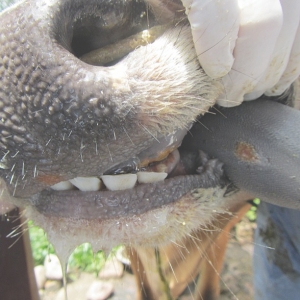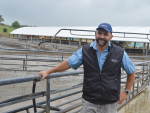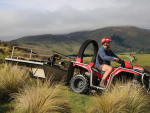A bigger outbreak would cost about A$15 billion.
One case would see all Australian export markets slammed shut, causing the milk price to crash and closing all beef export markets, including those for cull cows.
Australian vet Rob Bonanno says biosecurity remains an enormous issue in Australia and on-farm biosecurity is crucial and needs to remain top of mind. Bonanno and other Australian vets recently took part in training commissioned by the Australian Department of Agriculture, Fisheries and Forestry (DAFF) and delivered by the Food and Agriculture Organisation of the United Nations (FAO). Nepal is rife with FMD, so the Australian Government has bought 80 places in the training programme over a 12-month period
FMD is an airborne virus that can survive outside a host animal for 30 days. Cows are infected by inhalation. Pigs act as amplifiers of the disease; Bonanno says one pig could theoretically produce enough of the virus to infect 300,000 cows.
“Biosecurity on-farm is critical and is something we’ve overlooked for a long time,” he said.
“Proper on-farm biosecurity will keep endemic diseases out of a property. If all farmers in Australia worked hard to control movements in livestock on and off property, that would be one way to prevent a small outbreak becoming a big outbreak – of anything.”
He says quarantine surrounding imported livestock and genetics was excellent, but Australia’s border security needed to be improved.
“The way FMD is likely to get into Australia is in illegally imported foodstuffs, brought in as a gift. The next most likely way is from someone going to a country with FMD, like Nepal or Egypt, returning with the virus in their clothes or on their footwear, and visiting a piggery or farm.
“The virus can last up to 30 days. As people trek in Nepal, cattle wander through the streets so it could easily be brought in on someone’s boots if biosecurity protocols weren’t followed.
“Undeclared food products could also cause an outbreak. Infected animals produce infected cheese and meat. If this is brought in and fed as scraps to pigs, it would be disastrous.
“I reckon the virus has probably been here many times, that’s my theory, but we haven’t had the virus and susceptible animals in the same room together, thank God.
Shepparton – with a large migrant population and large farm sector – is considered a higher risk area. Anywhere with an urban/rural fringe is considered high risk.
“Farmers that have backpackers and itinerant workers should remain conscious they are a potential risk. Someone that works on three or four farms is also a risk, as endemic diseases can be transported via clothing.”
Bonanno says some people would get rich out of eradicating FMD but many would go broke. Everything on property not made out of wood or metal would be destroyed, including silage, hay, embryos, stored semen and animals.
“It would be just devastating, there’s no other way to describe it.”
















